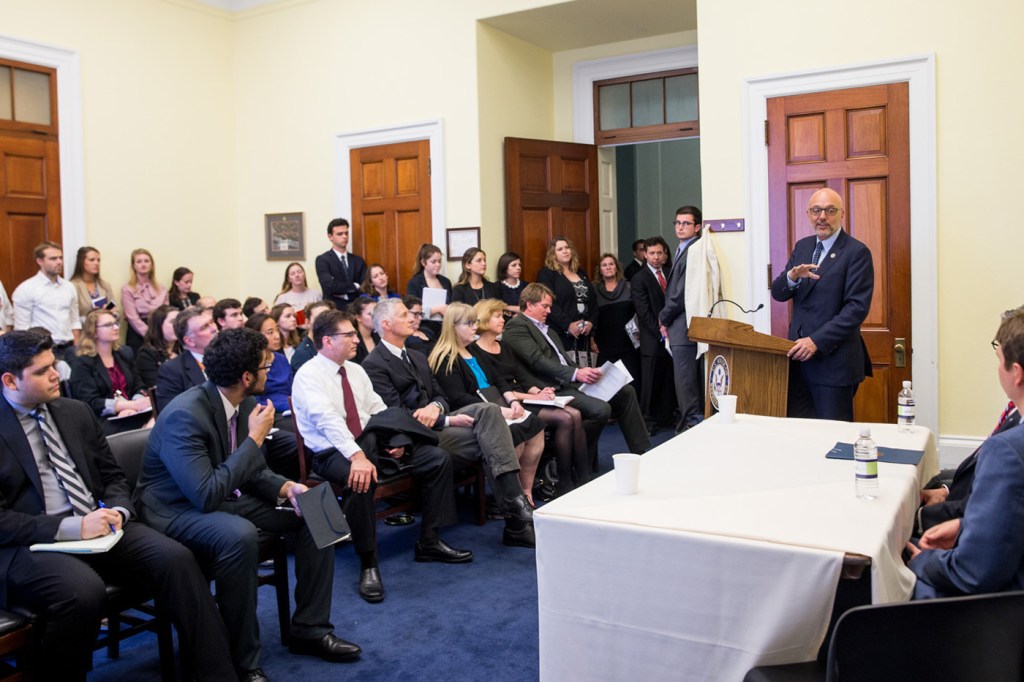Northeastern co-hosts Capitol Hill briefing on coastal sustainability

Northeastern co-hosted a Capitol Hill briefing on coastal sustainability on Wednesday afternoon, convening a panel of stakeholders to discuss the threats facing coastal communities and the best practices for keeping them secure.
Coastal communities are facing increasing threats related to sea-level rise, ecosystem degradation, extreme weather events, and port security. More than half of the world’s population lives near the coast, with a growing number of people residing in major coastal cities like Boston and Miami.
Northeastern is a global leader in coastal research, particularly through its work at the Marine Science Center and the newly formed Coastal Sustainability Institute. The university’s participation in the briefing aligned with the institution’s focus on solving global challenges in sustainability, one of its three programmatic pillars.
Geoff Trussell, director of both the Marine Science Center and the Coastal Sustainability Institute, noted that $35 trillion of the world’s assets, or 10 percent of the global gross domestic product, will be at stake in coastal cities by 2050.
“At this point it doesn’t matter the cause of sea level rises. What matters is how we adapt to these changes,” he said. “We need natural scientists, social scientists, engineers, policy makers, and economists working together on these problems to develop truly innovative solutions that will lead to cleaner, safer, and smarter coastal communities.”
Florida International University’s Washington, D.C. branch co-hosted the briefing, which was streamed live on its Facebook page. In addition to Trussell, panelists included U.S. Rep. Carlos Curbelo of Florida, a member of the bipartisan Climate Solutions Caucus; Craig McLean, assistant administrator for the National Oceanic and Atmospheric Administration’s Oceanic and Atmospheric Research office; Todd Crowl, director of FIU’s Southeast Environmental Research Center; and Steven Scyphers, assistant professor in Northeastern’s College of Science.
Each spoke briefly, delivering lightning talks on the importance of achieving coastal sustainability. “This is a real challenge that more Americans all over the country are going to be facing over the coming years,” said Curbelo. “I encourage you to reach out to all members of Congress and express to them that this truly isn’t a partisan issue.”
Crowl, Scyphers, and Trussell underscored the importance of coastal research funding from NOAA, the National Science Foundation, and other scientific organizations that support the cause, acknowledging their backing throughout the briefing. “I really want to emphasize how fundamentally important NOAA and the NSF are to supporting our intellectual advancement and understanding of these issues,” Trussell explained. “Without funding from these and other scientific organizations, we’re really not going to move forward.”
McLean, who is responsible for overseeing, directing, and implementing NOAA’s research enterprise, shared a staggering stat. Coastal communities, he said, generate some $7.6 billion of economic activity every year, a figure that is now under attack due to climate change. As he put it, “If the coast that we know today is not the coast that we will have tomorrow—and our forecasts certainly indicate that there will be significant changes—that puts that prosperity in jeopardy.”
Scyphers, who runs the Social-Ecological Sustainability Lab, focused on his research into how homeowners manage their shorelines. It’s a project, he said, with the goal of identifying conservation strategies that are most likely to succeed given the need for stakeholder buy-in.
In a 2014 study, Scyphers and his research partners used a 40-question survey to develop a better understanding of the perceptions and experiences of 400 homeowners living on Mobile Bay in Alabama. They found that there was a lot of misinformation regarding the environmental impacts and cost-effectiveness of various shoreline solutions—including vertical walls and rocks—suggesting the need to promote better decision-making among homeowners.
“This is the blueprint we’re using to apply an interdisciplinary perspective across a range of problems,” he said.





